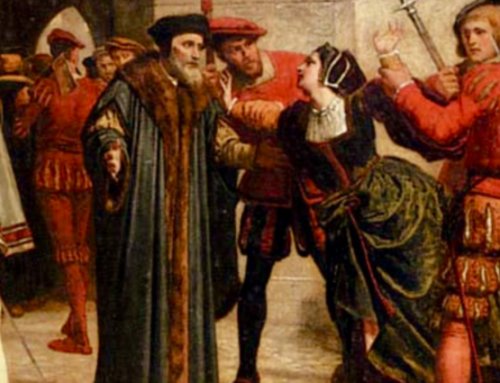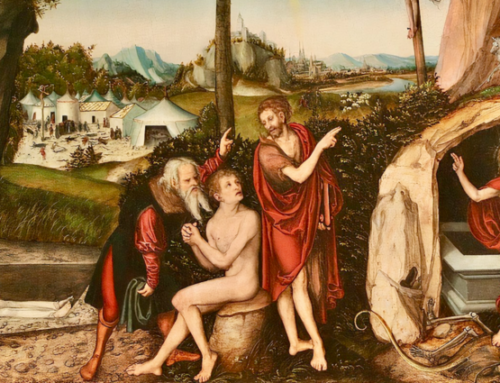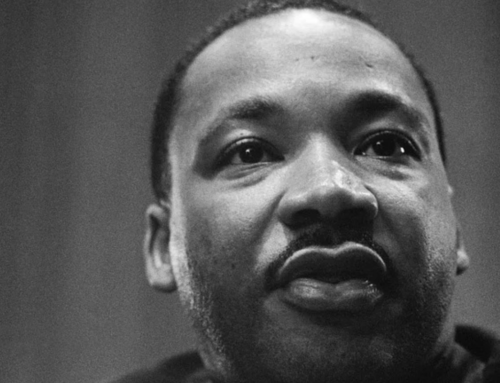This past Wednesday night, Dr. Robert George, McCormick Professor of Jurisprudence and Director of the James Madison Program in American Ideas and Institutions at Princeton University, gave the keynote address at the Archdiocese of Galveston-Houston’s annual Red Mass. The Red Mass marks the traditional beginning of the judicial year and affords the opportunity for those in the legal community to receive the spiritual graces and inspiration to defend truth and justice. Dr. George’s lecture was, as to be expected, thought-provoking and pertinent to the concerns of his audience, consisting almost entirely of Christian lawyers and judges. Following is a detailed summary of his talk as well as a few questions and issues his talk raises.
The main thrust of Dr. George’s lecture was to advance positive reasons to support natural law theory, an important goal considering wide-spread skepticism that objectively true and universally applicable moral principles exist. Another principle theme was to provide a framework for talking about human rights in a meaningful, substantive way. We tend to use the word so casually that we mean little more by it than the political and social endorsement of something we want. Dr. George contends that if the basis of rights is to be more than what a person desires, we need to articulate the basis of rights in way that provides for real human rights without elevating citizens’ whims and desires to the level of a “right.”
Reason, Free Will, and Moral Standards
According to Dr. George, natural law theory provides a persuasive alternative to other theories because it can explain two features of human action and experience that other theories, such as utilitarianism and biological determinism, not only cannot explain, but dismiss as mere illusions. Natural law can also account for the fact that most of us act “as if” there are morally binding, objective and universal principles of human conduct, even if we do not believe such principles exist. As Dr. George remarked, even Richard Dawkins, for all of his denial of moral principles, appeals to them when he complains that people who reject evolution are stupid and “wicked.”
The first feature of human action and our experience of these actions is that we act for non-instrumental reasons. For example, when one seeks a liberal arts education for the sake of knowledge for its own sake, as opposed to a professional education for the sake of money and prestige, one’s action is not for the sake of some practical advantage beyond the good of the education itself. Similarly, often the care and concern we show for friends, family and others is done for the good of the friend or family member (think Blessed Mother Theresa), or the good of the friendship itself, and not for the sake of some other end such as social advantage, money, or consolation. These examples illustrate what we notice about our actions and those of others–that we do not always act for instrumental reasons, for some good or goal beyond the immediate goal we are seeking.
The second experience natural law acknowledges is our capacity to act freely and with knowledge of the good. We experience many of our actions as free, not determined by instinct or biological forces beyond our control, or as Dr. George put it, we see that “we are the cause of things that we are not caused to cause.” We also recognize that we have the capacity to discern the goods that we need in order to flourish as human beings, whether that be education for the full development of our intellectual capacities, or food and exercise for the full development and well-being of our bodies. Although we often fail, we do, at times, discern what is truly good for us and then, even though our desires may be directing us to lesser goods, freely choose what is truly good.
In contrast to some theories of human behavior, natural law theories acknowledge the reality of these two features of human actions. A Humean, non-cognitive approach holds that we do not act freely and that our actions are determined by our passions. While we use reason to determine the best means to satisfying our desires, an objective, universal standard of behavior exists only to the extent that we “ought” to seek the best and most efficient means of satisfying our desires. Biological determinism takes Hume a step further, reducing the cause of all of actions, mental and physical, to efficient and material causes, so that our genes or other components of our material make-up determine all that we do.
The reason according to Dr. George that both theories are less persuasive than natural law is that they neither explain nor acknowledge free will and reason (in the more expansive sense of discerning our true good, rather than merely calculating the most efficient means for satisfying our desires) as irreducible facts of human action. Dr. George did not imply that he thinks a deductive proof of the existence of free will and reason is possible; rather, his argument is that any theory that would deny the existence of free will and reason must “bite the bullet” and deny the data of our experience as human agents. Thus, Dr. George contends that natural law, which starts from the premise that we can know and freely choose what is truly good, is more reasonable than any theory that considers reason and free will a mere illusion.
Once we acknowledge our capacity to make free and rational choices, we can discern objective, universally obligatory standards of human conduct as well as fundamental human rights. The very concept of morality requires that there are standards that we ought to live up to and that we can know what these standards are and freely choose to follow them. If we are not free, then it makes no sense to say we “ought” to conform our actions to these standards. For then we either follow them or we don’t, but we cannot say that we “ought” to, in the sense of choosing to do so when we could also choose otherwise. Further, if our reason cannot discern what is truly good, we cannot be held responsible for failing to choose the good. This would undermine the moral force of any behavioral standards because we would be obligated to do what we would be unable to do except by chance.
Before explaining how free will and reason provide the foundation for human rights, Dr. George pointed out that once we have established that free will and reason are real and not mere illusions and that, as a result, humans have the capacity for moral conduct, the next question is what is the specific content of our moral standards–i.e. what specifically ought we to do or ought not to do. One approach, according to natural law theorists, is to look to our human nature, which is held to be complex, but determinate. Based on human nature, we can know what is necessary for full human flourishing. For instance, the good related to the physical aspect of our nature is health, which requires healthy food, shelter, clothing and exercise. The spiritual, intellectual and social aspects of our nature require the goods of education, religion, friendship and community. When we look to the constitutive components of our human nature, we can identify the goods that all humans require for full human flourishing. Because human flourishing and the goods required to flourish fully are common to all humans, they provide objective, universally applicable standards of human conduct. For example, because we know that we need healthy food for the flourishing of our physical and mental health, we can say that humans ought to seek such a good as well as the conditions necessary to seek and obtain it. While it was beyond the scope of Dr. George’s talk to formulate all of the specific moral principles that derive from the requirements of full human flourishing, he was at least able to explain that full human flourishing and the goods required thereof provide a reason-based foundation for objective, universally applicable moral norms.
The Basis of Human Rights
As mentioned above, the second principle theme of Dr. George’s talk was the subject of human rights. We have a tendency, according to Dr. George, to talk about rights in a very loose and casual fashion, so much so that we have reached the point of considering as a right any desire we have that we think society and our political and legal institutions ought to acknowledge as something to which we are entitled. But a social order cannot survive if it elevates every citizen’s desires and wants to the level of a right, because the alleged rights of some will irrevocably and irreconcilably come into conflict with the alleged rights of another. We therefore need the basis for rights to be something other than “I want x, or I desire y.”
Dr. George proposes the basis of rights to be the human capacities of free will and rationality. Humans are the only organism that we know of in the entire physical universe that possess such capacities. While plants are animate and animals are both animate and sensate, humans are not only animate and sensate, but possess the capacities of intellectual insight, reasoning and the ability to choose and act freely. Due to these capacities of free will and reason, humans have a special dignity, and because the capacities of free will and reason are constitutive features of human nature, this dignity is inherent in every human person.
The extent of this dignity and what it demands with respect to the treatment of others and ourselves is reflected in the respect people have historically given to divinity. Dr. George attributes this intense respect to the recognition that divinity involves freedom, or the ability to be an “uncaused cause.” Because humans have the capacity through their actions to be “the cause of things that they are not caused to cause”, the freedom inherent in human nature imparts to human persons a God-like dignity and thus entitles each of us to a profound respect, one we owe not only to others but, because we too are human persons, also ourselves. Dr. George noted that Kant ably articulates the requirements of this respect we owe to ourselves and other human persons. Kant’s formulation is that we must “act so as to treat man, in your own person as well as in that of anyone else, always as an end, never merely as a means.”
The inherent dignity of and respect for human persons, according to Dr. George, provides a firm foundation for a meaningful conception of human rights, both negative and positive. With respect to negative rights we can say for instance that humans have a right not to be enslaved. Because slavery uses another person as an means to one’s comfort, economic well-being, etc. it offends against the inherent dignity of the human person. Without providing the detailed steps of the argument, Dr. George suggests that human dignity also provides a basis for certain positive rights, such as the right to healthcare or education. He cautions, however, that just because humans have a right to healthcare, for instance, that does not mean that the government has a obligation to provide it. In other words, identifying a specific human right does not itself establish who is responsible for providing the goods associated with that right or what priority that right has in relation to other rights. Such issues are matters of prudential judgment that depend on various contingent circumstances. In fact, Dr. George, claims that there can be multiple, even incompatible, prudential judgments as to how a given right is to be honored and yet each of those judgments be correct. In such a case, it would be permissible for the government to choose one of the various solutions over the others and citizens would be obligated to respect the government’s choice of means to realize the human right in question.
Natural Law and Religion
Another advantage of natural law theory is that issues of morality and human rights are not left solely to the province of religion. Natural law provides a theory of human conduct that can be justified on the basis of reason alone. Furthermore, appeal to the natural law and the conclusion derived therefrom are not necessarily incompatible with the dogmas of different religions, whether it be Christianity, Islam, Judaism, Hinduism or Buddhism, or with a reasonable person of good will who claims no religion. As Dr. George pointed out, this is especially true of Christianity, at least Roman Catholic Christianity, for as John Paul II’s Fides et Ratio says, reason and faith are two wings of a dove in its ascent to heaven. Given the compatibility of natural law theory with diverse religious viewpoints, it provides a common ground on which people with different perspectives can strive for consensus regarding morality and the basic human rights that governments and their laws ought to respect.
To summarize, Dr. George advanced a number of points in support of the persuasiveness of natural law theory. First, natural law theory acknowledges the reality of our experience of acting knowingly and freely and uses this experience as a foundation for morality. Second, natural law theory provides for an objective, universally applicable set of moral standards, which accords with our common-sense view that some things like murder are not permissible for anyone, at anytime or place. Third, natural law not only enables us to talk about rights in a meaningful, substantive way, but provides a basis for identifying genuine human rights. Finally, natural law provides a common ground that persons from various religious traditions, or no tradition at all, may work from in addressing questions of morality, human rights and laws.
Questions and Issues
To conclude, I will point out just a few issues and questions Dr. George’s talk raises. Before doing so, however, it is only fair to explain that while he was addressing an exceptionally bright and accomplished audience, many of whom have received superb legal training, most of the audience had not had any formal training in moral philosophy or theology. Appropriately then, his talk was challenging, but geared toward explaining the foundations of morality and law to those in the legal profession, not to academic philosophers or theologians.
Dr. George pointed out in his talk that human flourishing provides a basis for determining moral norms. Determining what is necessary for human flourishing requires that human nature be determinate. As the history of philosophy, at least since Descartes, shows, however, there is a great deal of disagreement about what constitutes human nature. Thus, natural law theory would need to provide a strong defense of its particular understanding of human nature. While I tend to think the view of human nature that natural law theorist generally work from is a persuasive one, historical disagreements about human nature would suggest otherwise. It would seem then that the question of what constitutes human nature is a stumbling block to the persuasiveness of natural law theory.
Second, Dr. George suggested that recognizing the dignity of the human person does not require that one answer the God question. Dr. George’s talk indicated that we can infer such dignity from the profound respect religious people have afforded divinity due to its freedom, or ability to act as an uncaused cause. A non-believer could challenge this argument, however, by pointing out that just because religious persons have, in fact, shown respect to beings possessing freedom that does not necessarily entail that all beings, especially humans, who are not divine, are entitled to that respect. Further, one could argue that just because humans have reason and free will in addition to being sentient and animate beings they are not entitled to more respect than those beings that do not have reason and free will. To address these challenges, natural law theory would need to further explain how the capacities of free will and reason entitle human persons to such dignity.
Third, Dr. George mapped out the intellectual landscape as consisting of those that would deny objective, universally applicable moral standards, such as utilitarians and biological determinist, fideist, who argue that morality is inextricably bound up with religion and that therefore there is no neutral, rational basis to which one can appeal to justify moral norms and natural law theorist who believe there is a common rational basis to support objective, universally applicable moral standards. Dr. George did not consider in his talk another position, exemplified by two Catholic theologians, Tracy Rowland and David Schindler (and they would also include Pope Benedict). This position advocates a moral theology that uses reason to develop a morality, but always from within and based on the articles of the Christian faith. This position neither severs faith from reason nor reason from faith. In response to the objection that this type of moral theology would only appeal to those who share its religious assumptions, its proponents would say that its appeal and persuasiveness derives from the truth, beauty and goodness of the Christian faith that it reveals. Natural law theory that relies on reason alone concedes too much to the world and belies a lack of confidence in the ability of a well-articulated expression of Christian morality to change hearts and minds. Thus, this school of thought might argue that Dr. George has misconstrued John Paul II’s Fides et Ratio as well as the image of the dove Dr. George appeals to as evidence that John Paul II endorses his position. By appealing to reason alone, natural law theory tries to ascend to heaven on only one wing instead of the two wings of faith and reason working in concert.
Finally, though Dr. George did not raise this issue in his talk, given that his audience was primarily lawyers and judges, we may question whether we actually want judges and lawyers appealing to natural law in their application and interpretation of civil and common law. As Russell Kirk opines, “while it would certainly be good if the civil law were shaped in conformity to natural law…it does not follow that judges should be permitted to push aside the Constitution or statutory laws and substitute their private interpretations of natural law. To give the judiciary such power would produce some curious decisions, sweeping away precedent, which might be highly distressing to friends of the classical and Christian natural law…Left to their several private judgements of what is “natural,” some judges indubitably would do mischief to the person and the republic.” In fact, we have seen the results of this, as Russell Hittinger observes, in “the emergence in our day of the natural law of lifestyle choices.” Thus, we may question whether judges and lawyers, who are not generally trained in natural law theory, should appeal to the natural law in their interpretation and application of civil law.
Of course it was only due to the limits of time that Dr. George was not able to address those issues above as well as others. Overall, Dr. George’s lecture was an excellent, thought-provoking introduction to a topic important to lawyers and judges both in their professions and in their lives as citizens.
Books on the topic of this essay may be found in The Imaginative Conservative Bookstore. The Imaginative Conservative applies the principle of appreciation to the discussion of culture and politics—we approach dialogue with magnanimity rather than with mere civility. Will you help us remain a refreshing oasis in the increasingly contentious arena of modern discourse? Please consider donating now.








Excellent article. It is a good summary about natural law and that it doesn’t need a religious connotation.
I do want to add that the human nature aspect of natural law seems to be pessimistic rather than cynical, pragmatist, or idealist.